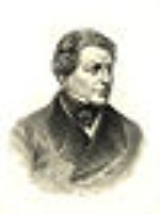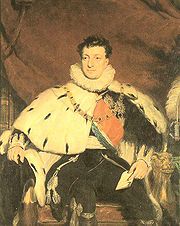
Pedro de Sousa Holstein
Encyclopedia
 |
|
| Prime Minister of Portugal Prime Minister of Portugal Prime Minister is the current title of the chief of the Portuguese Government. As chief executive, the Prime Minister coordinates the action of ministers, representing the Government from the other organs of state, accountable to Parliament and keeps the President informed... (President of the Council of Ministers) |
|
| Order: | 1st, 14th and 16th |
|---|---|
| Term of Office | (1st) September 24, 1834 – May 4, 1835 (2nd) February 7, 1842 – February 9, 1842 (3rd) May 20, 1846 – October 6, 1846 (all as Marquess de Palmela) |
| Predecessor: | (1st) None (2nd) Joaquim António de Aguiar Joaquim António de Aguiar Joaquim António de Aguiar was a Portuguese politician. He held several relevant political posts during the Portuguese constitutional monarchy, namely as leader of the Cartists and later of the Partido Regenerador... (3rd) Count de Tomar |
| Successor: | (1st) Count de Linhares (2nd) Count de Tomar (3rd) Duke de Saldanha |
| Date of Birth | May 8, 1781 |
| Place of Birth: | Turin Turin Turin is a city and major business and cultural centre in northern Italy, capital of the Piedmont region, located mainly on the left bank of the Po River and surrounded by the Alpine arch. The population of the city proper is 909,193 while the population of the urban area is estimated by Eurostat... , Italy |
| Date of Death | October 12, 1850 |
| Place of Death: | Lisbon Lisbon Lisbon is the capital city and largest city of Portugal with a population of 545,245 within its administrative limits on a land area of . The urban area of Lisbon extends beyond the administrative city limits with a population of 3 million on an area of , making it the 9th most populous urban... |
| Wife: | Eugénia Francisca Xavier Teles da Gama |
| Occupation: | Diplomat, military officer |
| Political Party: | Chartist |
Dom Pedro de Sousa Holstein, 1st Count, 1st Marquess and 1st Duke of Palmela
Palmela
Palmela is a town and a municipality in Portugal with a total area of and a total population of 58,222 inhabitants.The municipality is composed of 5 parishes, and is located in Setúbal District, about south of Lisbon.The municipal holiday is June 1....
(formerly 1st Duke do Faial
Faial Island
Faial Island , also known in English as Fayal, is a Portuguese island of the Central Group of the Azores....
) (1781–1850) was one of the most important Portuguese
Portugal
Portugal , officially the Portuguese Republic is a country situated in southwestern Europe on the Iberian Peninsula. Portugal is the westernmost country of Europe, and is bordered by the Atlantic Ocean to the West and South and by Spain to the North and East. The Atlantic archipelagos of the...
diplomats and statesmen in the first half of the 19th century. He also served as the country's first Prime Minister. He was also a freemason.
He was born in Turin
Turin
Turin is a city and major business and cultural centre in northern Italy, capital of the Piedmont region, located mainly on the left bank of the Po River and surrounded by the Alpine arch. The population of the city proper is 909,193 while the population of the urban area is estimated by Eurostat...
, a scion of the Portuguese de Sousa family, Lords of Calhariz. The 'Holstein' element of his family name came from his paternal grandmother Maria Anna Leopoldine, Princess of Schleswig-Holstein-Sonderburg-Beck, daughter of Friedrich Wilhelm I, Duke of Schleswig-Holstein-Sonderburg-Beck. His uncle Frederico Guilherme de Sousa had been governor of Portuguese India.
He earned notoriety at an early age by telling Napoleon to his face at the conference in Bayonne
Bayonne
Bayonne is a city and commune in south-western France at the confluence of the Nive and Adour rivers, in the Pyrénées-Atlantiques department, of which it is a sub-prefecture...
in 1808 that the Portuguese would not ‘consent to become Spaniards’ as the French Emperor wanted. He was Portuguese plenipotentiary
Plenipotentiary
The word plenipotentiary has two meanings. As a noun, it refers to a person who has "full powers." In particular, the term commonly refers to a diplomat fully authorized to represent his government as a prerogative...
to the Congress of Vienna
Congress of Vienna
The Congress of Vienna was a conference of ambassadors of European states chaired by Klemens Wenzel von Metternich, and held in Vienna from September, 1814 to June, 1815. The objective of the Congress was to settle the many issues arising from the French Revolutionary Wars, the Napoleonic Wars,...
in 1814, where he attempted to press Portugal's claims to Olivenza
Olivenza
Olivenza or Olivença is a town in the autonomous community of Extremadura, situated on a disputed section of the border between Portugal and Spain...
, and to the Congress of Paris in 1815. After this he was briefly ambassador to London, but then was appointed secretary of state for foreign affairs in Brazil
Brazil
Brazil , officially the Federative Republic of Brazil , is the largest country in South America. It is the world's fifth largest country, both by geographical area and by population with over 192 million people...
. After the Portuguese Revolution of 1820 he was commissioned by the revolutionary junta to inform the king (Dom João VI, then living in Brazil) of what had taken place and to request his return to Portugal. In 1823 he was made a Marquis and became foreign minister as well as head of the committee which D. João appointed to devise a new constitutional charter
Charter
A charter is the grant of authority or rights, stating that the granter formally recognizes the prerogative of the recipient to exercise the rights specified...
. The resulting document, to which the King was unable to agree, was so liberal that it drew down on Palmela the hatred of the reactionary forces in the country, especially the Queen and the Infant Dom Miguel, who in 1824 had him arrested. After he obtained his liberty he was made a minister of state and returned to London as ambassador.

Dom Pedro
Dom Pedro is the traditional Portuguese appellation of several kings of Portugal:* Peter I of Portugal* Peter II of Portugal* Peter III of Portugal* Pedro IV of Portugal* Pedro V of Portugal...
, Emperor of Brazil, appointed Palmela guardian to his daughter, the rightful Queen Maria II, and he acted as her ambassador at the British court. In 1830 he set up the young queen’s regency on Terceira in the Azores
Azores
The Archipelago of the Azores is composed of nine volcanic islands situated in the middle of the North Atlantic Ocean, and is located about west from Lisbon and about east from the east coast of North America. The islands, and their economic exclusion zone, form the Autonomous Region of the...
; it was at this time that he became acquainted with Captain Charles Napier
Charles Napier (naval officer)
Admiral Sir Charles John Napier KCB GOTE RN was a Scottish naval officer whose sixty years in the Royal Navy included service in the Napoleonic Wars, Syrian War and the Crimean War, and a period commanding the Portuguese navy in the Liberal Wars...
whom he considered the best person to command the Liberals' navy. When Dom Pedro took charge of the regency in person in 1832 he named Palmela as his foreign minister, in which capacity he acted against Miguel from London. In 1833 he sailed with Charles Napier bringing mercenary reinforcements to Oporto, where Pedro was being besieged, and took part in the subsequent expedition to the Algarve of Napier and the Duke of Terceira
António Severim de Noronha
Dom António José de Sousa Manoel e Meneses Severim de Noronha , 7th Count of Vila Flor, 1st Marquis of Vila Flor and 1st Duke of Terceira, was a Portuguese military officer, statesman and a leader of the Constitutionalist side in the Liberal Wars, as well as a Prime Minister of Portugal.He was born...
. After Napier’s naval victory off Cape St Vincent enabled Pedro to occupy Lisbon
Lisbon
Lisbon is the capital city and largest city of Portugal with a population of 545,245 within its administrative limits on a land area of . The urban area of Lisbon extends beyond the administrative city limits with a population of 3 million on an area of , making it the 9th most populous urban...
, Palmela retired from his offices. He served as the first Prime Minister of the newly formed constitutional monarchy in Portugal from September 24, 1834 to May 4, 1835. He was Prime Minister again for two days in February 1842 and from March to October 1846.
Dom Pedro was successively made Count of Palmela (by Queen Maria I
Maria I of Portugal
Maria I was Queen regnant of Portugal and the Algarves from 1777 until her death. Known as Maria the Pious , or Maria the Mad , she was the first undisputed Queen regnant of Portugal...
, on April 11, 1812), Marquis of Palmela (by King John VI
John VI of Portugal
John VI John VI John VI (full name: João Maria José Francisco Xavier de Paula Luís António Domingos Rafael; (13 May 1767 – 10 March 1826) was King of the United Kingdom of Portugal, Brazil and the Algarves (later changed to just King of Portugal and the Algarves, after Brazil was recognized...
on July 3, 1823) and Duke of Faial
Duke of Faial
Duke of Faial is a Portuguese title of nobility granted by royal decree of Queen Maria II of Portugal, dated from April 4, 1833, to Dom Pedro de Sousa Holstein , a Portuguese politician during the first half of the 19th Century...
(by Queen Maria II on April 4, 1836).
Finally, on October 18, 1850, Queen Maria II substituted its Dukedom of Faial by the new title of Duke of Palmela
Duke of Palmela
The Duke of Palmela is a Portuguese title granted by royal decree of Queen Maria II of Portugal, dated from October 18, 1850, to Dom Pedro de Sousa Holstein , a Portuguese politician during the first half of the 19th Century...
.
Family
Pedro de Sousa Holstein married, on June 4, 1810, Eugénia Francisca Xavier Teles da Gama (1798–1860), and they had 15 children:- Alexandre de Sousa e Holstein (1812–1832), 1st Count of Calhariz;
- Domingos de Sousa Holstein (1818–1864), succeeded his father as 2nd Duke of PalmelaDuke of PalmelaThe Duke of Palmela is a Portuguese title granted by royal decree of Queen Maria II of Portugal, dated from October 18, 1850, to Dom Pedro de Sousa Holstein , a Portuguese politician during the first half of the 19th Century...
; - Rodrigo de Sousa (1824–1840), honorary Marquis;
- Francisco de Sousa Holstein (1838–1878), 1st Marquis of Sousa Holstein;
- Tomás de Sousa e Holstein Beck (1839–1887), 1st Marquis of Sesimbra;
- Filipe de Sousa Holstein (1841–1884), 1st Marquis of Monfalim;
- 7 daughters;
- 2 sons, who died young.
See also
- Duke of PalmelaDuke of PalmelaThe Duke of Palmela is a Portuguese title granted by royal decree of Queen Maria II of Portugal, dated from October 18, 1850, to Dom Pedro de Sousa Holstein , a Portuguese politician during the first half of the 19th Century...
- Duke of FaialDuke of FaialDuke of Faial is a Portuguese title of nobility granted by royal decree of Queen Maria II of Portugal, dated from April 4, 1833, to Dom Pedro de Sousa Holstein , a Portuguese politician during the first half of the 19th Century...
- List of Portuguese Dukedoms
- List of Portuguese Prime Ministers

